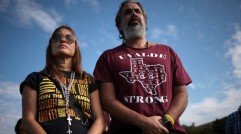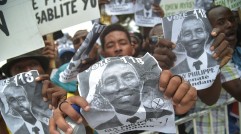People's Climate March 2014: Massive Global Rally to Be Held Sept. 21
The People's Climate March, a massive global rally on Sept. 21 in New York City, will lead up to a specially called-for United Nations summit on the climate crisis.
To date, 950 supporting organizations are supporting the mass rally, including non-government organizations, labor unions, grassroots networks, churches and faith organizations. Their members and volunteers will join in the two to three mile march through Manhattan from Columbus Circle, east along 59th Street, down 6th Avenue, west along 42nd Street to 11th Avenue.
The march in New York is being held in solidarity with events around the world -- 63 other events in North America, six in South America, 54 in Europe, 10 in South Asia, and 32 in Australia -- in cities like Berlin, Paris, Istanbul, London, Melborne, New Delhi and Rio de Janerio, among many others.
"Mass mobilization is one of the best ways we know of to shock the entire system into action. Mass marches don't always work: we weren't able to stop the buildup to the war in Iraq. But they sometimes succeed in historic ways. Take the 1982 anti-nuclear march, which pushed a hawkish Ronald Reagan to strike a deal with Russia and start reducing nuclear warhead arsenals. Or consider the 1963 March on Washington, which helped pass the Civil Rights Act," said Eddie Bautista, New York City Environmental Justice Alliance.
The emphasis of the march is to show politicans they need to choose a side, either the people or the polluters.
The Climate Summit 2014 at the United Nations was requested by UN Secretary General Ban Ki Moon for world leaders to discuss and commit to actions to address climate change and mobilize political will for an ambitious global agreement by 2015 that limits the world to a less than 2-degree Celsius rise in global temperature. President Barack Obama is planning to attend.
The summit is different from the annual Conference of the Parties and the United Nations Framework Convention on Climate Change and is being called because of the urgency and seriousness of the climate change situation for the global community and the desire of many that change must happen faster.
"The summit is the right moment for us to show our politicians what real leadership looks like. If we can put hundreds of thousands of people in the streets to call for climate justice -- and lift up the voices of the frontline communities most impacted by the crisis -- it could be the shock to the system that we've all been waiting for. It will show politicians that the climate crisis isn't some abstraction, that it's a burning public priority they must address immediately. No more false-promises and fancy-rhetoric; we want real action now," said Bautista.
Ten union groups are expected to travel from Connecticut to New York on Metro-North rail, which is collaborating with march organizers to ensure large numbers can travel to New York City.
What are you planning to do in your city or town?
Follow Rebecca Myles on Twitter.
Subscribe to Latin Post!
Sign up for our free newsletter for the Latest coverage!














